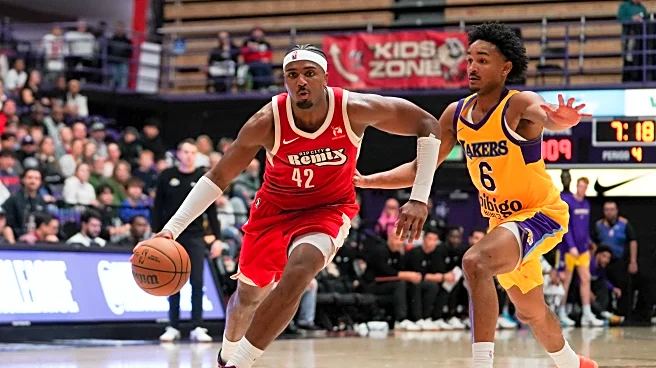What is the story about?
What's Happening?
The debate over youth sports scheduling is intensifying as parents and coaches weigh the benefits and drawbacks of overbooking young athletes. Concerns are mounting about the physical toll and potential injuries associated with playing multiple sports simultaneously. Parents are increasingly questioning whether the demanding schedules are negatively impacting family dynamics and healthy habits. The issue is highlighted by anecdotes of athletes who suffered injuries that derailed promising sports careers, such as a high school quarterback who required reconstructive surgery after a football injury, potentially affecting his future in baseball. The discussion also touches on the psychological impact of overtraining and the importance of allowing children to enjoy sports without excessive parental involvement.
Why It's Important?
The implications of overbooking in youth sports are significant for both the athletes and their families. Physically, the risk of overuse injuries and burnout is a concern, potentially affecting long-term health and sports participation. Psychologically, the pressure to excel in multiple sports can lead to stress and decreased enjoyment, impacting mental health. For families, the demanding schedules can disrupt family dynamics, leading to less time for healthy interactions and meals together. Economically, the pursuit of college scholarships through sports specialization can be costly and may not yield the expected returns, given the low percentage of athletes who advance to collegiate or professional levels. The debate underscores the need for balance between sports participation and overall well-being.
What's Next?
Families and coaches may need to reassess their approach to youth sports, considering the benefits of allowing children to focus on fewer sports to reduce injury risks and improve enjoyment. Discussions around the importance of rest and recovery are likely to continue, with recommendations for athletes to take breaks from specific sports to prevent overuse injuries. Additionally, there may be increased advocacy for the development of college club sports models, offering more participation opportunities without the intense pressure of competitive scholarships. Parents might also explore ways to reduce their involvement in their children's sports experiences, fostering autonomy and enjoyment for young athletes.
Beyond the Headlines
The cultural implications of youth sports overbooking are profound, reflecting societal pressures to achieve and excel from a young age. The trend raises ethical questions about the role of parents and coaches in shaping children's sports experiences and the potential for exploitation in pursuit of scholarships and professional opportunities. Long-term, the focus on specialization may shift as awareness grows about the benefits of diverse sports participation for physical and mental development. The conversation may also lead to broader discussions about the impact of technology and screen time on youth development, as parents seek to balance sports with other activities.

















